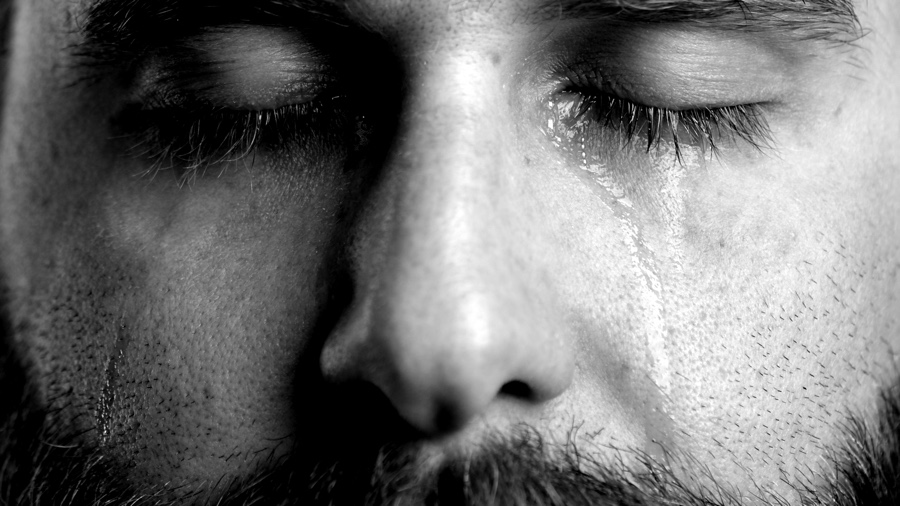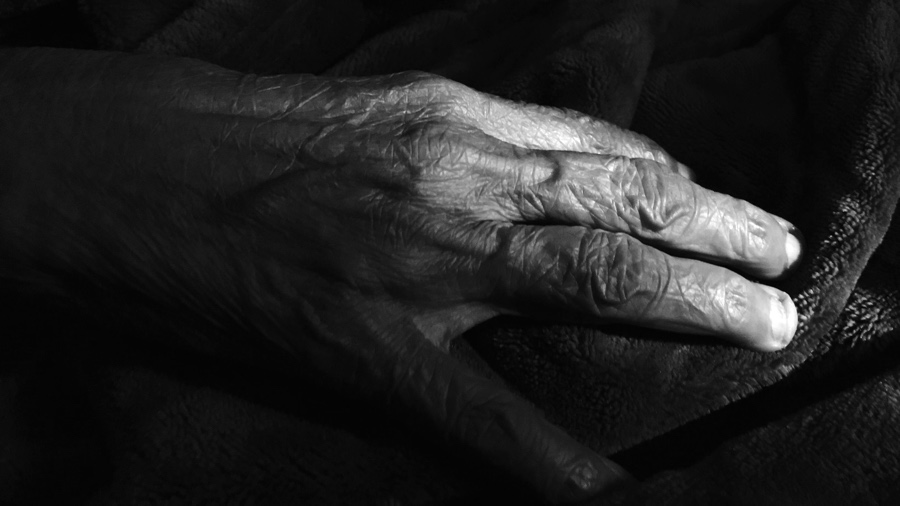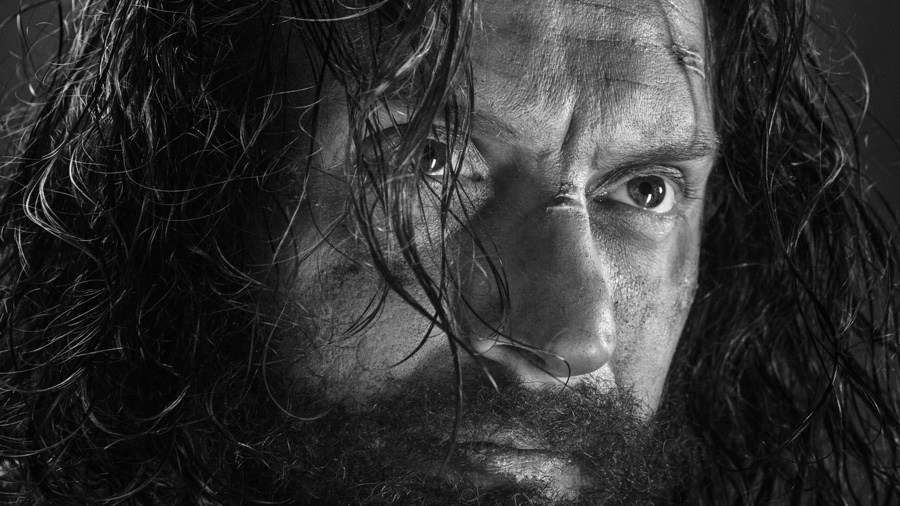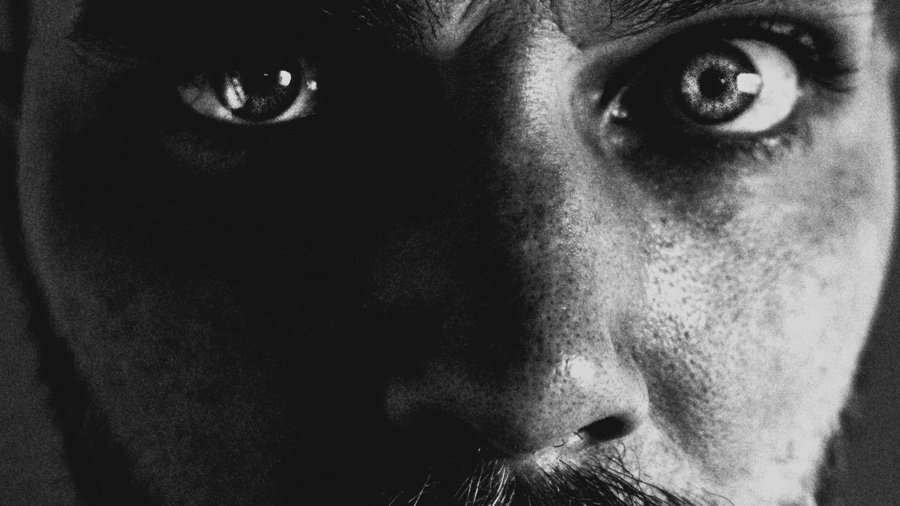The Roller Coaster
It’s a never-ending ride on a runaway rollercoaster - you’re a permanent passenger... tied down, buckled up, chained to your seat. The menacing vehicle snaps you at abrupt corners. It jerks you up impossible summits. It propels you, crashing down incredible valleys. It’s... anxiety. You’re trapped. The more you worry, the more helpless you feel. God knew that anxiety could do this to you. That’s why he said don’t worry... come to me and rest... in other words, trust me. It’s the only way to hit the brakes and bring anxiety to a halt.
For example:
Jesus gathered the children in His arms, and He laid His hands on them to bless them.When He had traveled on, a young man came and knelt in the dust of the road in front of Jesus.
Young Man:
Good Teacher! What must I do to gain life in the world to come?Jesus:
You are calling Me good? Don’t you know that God and God alone is good? Anyway, why ask Me that question? You know the Commandments of Moses: “Do not murder, do not commit adultery, do not steal, do not slander, do not defraud, and honor your father and mother.”Young Man:
Yes, Teacher, I have done all these since I was a child.Then Jesus, looking at the young man, saw that he was sincere and responded out of His love for him.
Jesus:
Son, there is still one thing you have not done. Go now. Sell everything you have and give the proceeds to the poor so that you will have treasure in heaven. After that, come, follow Me.The young man went away sick at heart at these words because he was very wealthy...
(Mark 10:16-22 The Voice)

Our Weakness, God’s Power
The kingdom of heaven. Its citizens are drunk on wonder. Consider the case of Sarai.[NOTE 1] She is in her golden years, but God promises her a son. She gets excited. She visits the maternity shop and buys a few dresses. She plans her shower and remodels her tent... but no son. She eats a few birthday cakes and blows out a lot of candles... still no son. She goes through a decade of wall calendars... still no son.
So Sarai decides to take matters into her own hands. (“Maybe God needs me to take care of this one.”)
She convinces Abram that time is running out. (“Face it, Abe, you ain’t getting any younger, either.”) She commands her maid, Hagar, to go into Abram’s tent and see if he needs anything. (“And I mean ‘anything’!”) Hagar goes in a maid. She comes out a mom. And the problems begin.
Hagar is haughty. Sarai is jealous. Abram is dizzy from the dilemma. And God calls the baby boy a “wild donkey” - an appropriate name for one born out of stubbornness and destined to kick his way into history.
It isn’t the cozy family Sarai expected. And it isn’t a topic Abram and Sarai bring up very often at dinner.

Finally, fourteen years later, when Abram is pushing a century of years and Sarai ninety…when Abram has stopped listening to Sarai’s advice, and Sarai has stopped giving it... when the
wallpaper in the nursery is faded and the baby furniture is several seasons out of date…when the topic of the promised child brings sighs and tears and long looks into a silent sky... God pays them a visit and tells them they had better select a name for their new son.
Abram and Sarai have the same response: laughter. They laugh partly because it is too good to happen and partly because it might. They laugh because they have given up hope, and hope born anew is always funny before it is real.
They laugh at the lunacy of it all.
Abram looks over at Sarai - toothless and snoring in her rocker, head back and mouth wide open, as fruitful as a pitted prune and just as wrinkled. And he cracks up. He tries to contain it, but he can’t. He has always been a sucker for a good joke.
Sarai is just as amused. When she hears the news, a cackle escapes before she can contain it. She mumbles something about her husband’s needing a lot more than what he’s got and then laughs again.
They laugh because that is what you do when someone says he can do the impossible. They laugh a little at God, and a lot with God - for God is laughing, too. Then, with the smile still on his face, he gets busy doing what he does best - the unbelievable.
He changes a few things - beginning with their names. Abram, the father of one, will now be Abraham, the father of a multitude. Sarai, the barren one, will now be Sarah, the mother.
But their names aren’t the only things God changes. He changes their minds. He changes their faith. He changes the number of their tax deductions. He changes the way they define the word impossible.
But most of all, he changes Sarah’s attitude about trusting God. Were she to hear Jesus’ statement about being poor in spirit, she could give a testimony: “He’s right. I do things my way, I get a headache. I let God take over, I get a son. You try to figure that out. All I know is I am the first lady in town to pay her pediatrician with a Social Security check.”
Two thousand years later, here’s another testimony:[NOTE 2]
“The last thing I wanted to do was fish. But that was exactly what Jesus wanted to do. I had fished all night. My arms ached. My eyes burned. My neck was sore. All I wanted was to go home and let my wife rub the knots out of my back.
“It had been a long night. I don’t know how many times we had thrown that net into the blackness and heard it slap against the sea. I don’t know how many times we had held the twine rope as the net sank into the water. All night we had waited for that bump, that tug, that jerk that would clue us to haul in the catch... but it had never come. At daybreak, I was ready to go home.
“Just as I was about to leave the beach, I noticed a crowd coming toward me. They were following a lanky fellow who walked with a broad swing and wide gait. He saw me and called my name. ‘Morning, Jesus!’ I called back. Though he was a hundred yards away, I could see his white smile. ‘Quite a crowd, eh?’ he yelled, motioning at the mass behind him. I nodded and sat down to watch.
“He stopped near the edge of the water and began to speak. Though I couldn’t hear much, I could see a lot. I could see more and more people coming. With all the pressing and shoving, it’s a wonder Jesus didn’t get pushed down into the water. He was already knee-deep when he looked at me.
“I didn’t have to think twice. He climbed into my boat, and John and I followed. We pushed out a bit. I leaned back against the bow, and Jesus began to teach.
“It seemed that half of Israel was on the beach. Men had left their work, women their household chores. I even recognized some priests. How they all listened! They scarcely moved, yet their eyes danced as if they were in some way seeing what they could be.
“When Jesus finished, he turned to me. I stood and had begun to pull anchor when he said, ‘Push out into the deep, Peter. Let’s fish.’

“I groaned. I looked at John. We were thinking the same thing. As long as he wanted to use the boat for a platform, that was fine. But to use it for a fishing boat - that was our territory. I started to tell this carpenter-teacher, ‘You stick to preaching, and I’ll stick to fishing.’ But I was more polite: ‘We worked all night. We didn’t catch a thing.’
“He just looked at me. I looked at John. John was waiting for my cue...
“I wish I could say I did it because of love. I wish I could say I did it out of devotion. But I can’t. All I can say is there is a time to question and a time to listen. So, as much with a grunt as with a prayer, we pushed out.
“With every stroke of the oar, I muttered. With every pull of the paddle, I grumbled. ‘No way. No way. Impossible. I may not know much, but I know fishing. And all we’re going to come back with are some wet nets.’
“The noise on the beach grew distant, and soon the only sound was the smack of the waves against the hull. Finally, we cast anchor. I picked up the heavy netting, held it waist-high, and started to throw it. That’s when I caught a glimpse of Jesus out of the corner of my eye. His expression stopped me in midmotion.
“He was leaning out over the edge of the boat, looking out into the water where I was about to throw the net. And, get this, he was smiling. A boyish grin pushed his cheeks high and turned his round eyes into half-moons - the kind of smile you see when a child gives a gift to a friend and watches as it is unwrapped.
“He noticed me looking at him, and he tried to hide the smile, but it persisted. It pushed at the corners of his mouth until a flash of teeth appeared. He had given me a gift and could scarcely contain himself as I opened it.
“‘Boy is he in for a disappointment,’ I thought as I threw the net. It flew high, spreading itself against the blue sky and floating down until it flopped against the surface, then sank. I wrapped the rope once around my hand and sat back for the long wait.
“But there was no wait. The slack rope yanked taut and tried to pull me overboard. I set my feet against the side of the boat and yelled for help. John and Jesus sprang to my side.
“We got the net in just before it began to tear. I’d never seen such a catch. It was like plopping down a sack of rocks in the boat. We began to take in water. John screamed for the other boat to help us.
“It was quite a scene: four fishermen in two boats, knee-deep in fish, and one carpenter seated on our bow, relishing the pandemonium.
“That’s when I realized who he was. And that’s when I realized who I was: I was the one who told God what he couldn’t do!
“‘Go away from me, Lord; I’m a sinful man.’ There wasn’t anything else I could say.
“I don’t know what he saw in me, but he didn’t leave. Maybe he thought if I would let him tell me how to fish, I would let him tell me how to live.
“It was a scene I would see many times over the next couple of years-in cemeteries with the dead, on hillsides with the hungry, in storms with the frightened, on roadsides with the sick. The characters would change, but the theme wouldn’t. When we would say, ‘No way,’ he would say, ‘My way.’ Then the ones who doubted would scramble to salvage the blessing. And the One who gave it would savor the surprise.”
“My power shows up best in weak people.”[NOTE 3]
God said those words. Paul wrote them down. God said he was looking for empty vessels more than strong muscles. Paul proved it.
Before he encountered Christ, Paul had been somewhat of a hero among the Pharisees. You might say he was their Wyatt Earp. He kept the law and order - or, better said, revered the Law and gave the orders. Good Jewish moms held him up as an example of a good Jewish boy. He was given the seat of honor at the Jerusalem Lions’ Club Wednesday luncheon. He had a “Who’s Who in Judaism” paperweight on his desk and was selected “Most Likely to Succeed” by his graduating class. He was quickly establishing himself as the heir apparent to his teacher, Gamaliel.
If there is such a thing as a religious fortune, Paul had it. He was a spiritual billionaire, born with one foot in heaven, and he knew it:
If anyone ever had reason to hope that he could save himself, it would be I. If others could be saved by what they are, certainly, I could! For I went through the Jewish initiation ceremony when I was eight days old, having been born into a pure-blooded Jewish home that was a branch of the old original Benjamin family. So I was a real Jew if there ever was one! What’s more, I was a member of the Pharisees, a group that demands the strictest obedience to every Jewish law and custom. And sincere? Yes, so much so that I greatly persecuted the Church, and I tried to obey every Jewish rule and regulation down to the very last point.[NOTE 4]
Blue-blooded and wild-eyed, this young zealot was hell-bent on keeping the kingdom pure - and that meant keeping the Christians out. He marched through the countryside like a general demanding that backslidden Jews salute the flag of the motherland or kiss their family and hopes goodbye.

All this came to a halt, however, on the shoulder of a highway. Equipped with subpoenas, handcuffs, and a posse, Paul was on his way to do a little personal evangelism in Damascus. That’s when someone slammed on the stadium lights, and he heard the voice.
When he found out whose voice it was, his jaw hit the ground, and his body followed. He braced himself for the worst. He knew it was all over. He felt the noose around his neck. He smelled the flowers in the hearse. He prayed that death would be quick and painless.
But all he got was silence and the first of a lifetime of surprises.
He ended up bewildered and befuddled in a borrowed bedroom. God left him there a few days with scales on his eyes so thick that the only direction he could look was inside himself. And he didn’t like what he saw.
He saw himself for what he really was - to use his own words, the worst of sinners.[NOTE 5] A legalist. A killjoy. A bumptious braggart who claimed to have mastered God’s code. A dispenser of justice who weighed salvation on a panscale.
That’s when Ananias found him. He wasn’t much to look at - haggard and groggy after three days of turmoil. Sarai wasn’t much to look at either, nor was Peter. But what the three have in common says more than a volume of systematic theology. For when they gave up, God stepped in, and the result was a rollercoaster ride straight into the kingdom.
Paul was a step ahead of the rich young ruler. He knew better than to strike a deal with God. He didn’t make any excuses; he just pleaded for mercy. Alone in the room with his sins on his conscience and blood on his hands, he asked to be cleansed.
Ananias’ instructions to Paul are worth reading: “What are you waiting for? Get up, be baptized and wash your sins away, calling on his name.”[NOTE 6]
He didn’t have to be told twice. The legalist Saul was buried, and the liberator Paul was born. He was never the same afterward. And neither was the world.
Stirring sermons, dedicated disciples, and six thousand miles of trails. If his sandals weren’t slapping, his pen was writing. If he wasn’t explaining the mystery of grace, he was articulating the theology that would determine the course of Western civilization.
All of his words could be reduced to one sentence. “We preach Christ crucified.”[NOTE 7] It wasn’t that he lacked other sermon outlines; it was just that he couldn’t exhaust the first one.
The absurdity of the whole thing kept him going. Jesus should have finished him on the road. He should have left him for the buzzards. He should have sent him to hell. But he didn’t. He sent him to the lost.
Paul himself called it crazy. He described it with phrases like “stumbling block” and “foolishness,” but chose, in the end, to call it “grace.”[NOTE 8]
And he defended his unquenchable loyalty by saying, “The love of Christ leaves [me] no choice.”[NOTE 9]
Paul never took a course in missions. He never sat in on a committee meeting. He never read a book on church growth. He was just inspired by the Holy Spirit and punch-drunk on the love that makes the impossible possible: salvation.
The message is gripping: Show a man his failures without Jesus, and the result will be found in the roadside gutter. Give a man religion without reminding him of his filth, and the result will be arrogance in a three-piece suit. But get the two in the same heart-get sin to meet Savior and Savior to meet sin-and the result just might be another Pharisee turned preacher who sets the world on fire.
Four people: the rich young man, Sarah, Peter, Paul. A curious thread strings the four together - their names.
The final three had their names changed: Sarai to Sarah, Simon to Peter, Saul to Paul.
But the first one, the young yuppie, is never mentioned by name.
Perhaps that’s the clearest explanation of the first beatitude:
Blessed are the poor in spirit,
for theirs is the kingdom of heaven (Matthew 5:3).
The one who made a name for himself is nameless, but the ones who called on Jesus’ name - and his name only - got new names and, even more, new life.

Study Guide: Our Weakness, God's Power
Blessed are the poor in spirit, for theirs is the kingdom of heaven.
- How does this chapter interpret being “poor in spirit”? How does this compare with any previous ideas you had about what this beatitude means?
- Luke’s version of this beatitude (found in Luke 6:20, 24) omits the “in spirit” idea entirely; it simply states that “the rich” have their reward here and therefore cannot expect a reward in heaven. And Jesus tells the rich young ruler directly that “it is hard for a rich man to enter the kingdom of heaven” (Matthew 19:23-24). Do you think the first beatitude applies especially to those who are poor in material possessions? If not, why does Matthew make these specific comments about material wealth? (You may find some ideas in the endnotes for this post.)
- List three reasons why being poor in spirit as described in this chapter is difficult for most of us. Why do we have such a hard time admitting our own inadequacy and failures even to God and ourselves?
- List what you consider your five greatest strengths and your five greatest weaknesses. Then examine your list in light of chapter 1. Does being poor in spirit mean denying your strengths or nor trying to improve your weaknesses? Does it mean being “down on yourself”? Why or why not?
- Is it possible to be both arrogant and insecure at the same time? What do you think are the motives behind the rich young ruler’s self-justification and over achievement?
- What is the difference between trying to achieve salvation and trying to please God? Between being poor in spirit and being a poor steward of your God-given gifts?
- Read the following parables describing the “kingdom of heaven”: Matthew 13:24-33, 44-50. What additional insight do these parables give about the nature of the “kingdom” in which the poor in spirit will live?
- Read Matthew 16:13-20, which tells the circumstances under which Peter’s name was changed and he was given the “keys to the kingdom of heaven.” What elements of this account point to Peter’s being poor in spirit? What does this passage tell you about the nature of the kingdom?
- What sort of positive change would you like in your life? According to this chapter, what would be your best strategy for such change?
Notes: Our Weakness, God’s Power
2. Luke 5
3. 2 Corinthians 12:9, LB
4. Philippians 3:4-6, LB
6. Acts 22:16
8. 1 Corinthians 1:23; Ephesians 2:8
9. 1 Corinthians 5:14, NEB
Credits:
This post appeared as part of an online booklet on UpWords.
© Max Lucado, UpWords, and maxlucado.com, all rights reserved. Used by permission.
May this pure and simple message of hope lift you up today. This electronic copy of Trusting More, Worrying Less is brought to you by UpWords, the ministry of Max Lucado. UpWords is a non-profit ministry that exists because of the generosity of people like you. It is our prayer that this ministry will continue to encourage the lives of those who seek a deeper relationship with the Lord. If this material has been beneficial to your spiritual life, please prayerfully consider contributing to our ministry with prayer and financial support. To donate, go to Max's website: MaxLucado.com.












Comments
Have thoughts on this article? Leave a comment